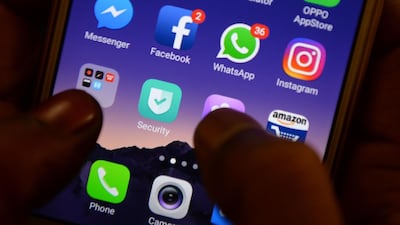You've heard of the cabbage soup diet, the Atkins, the paleo and the 5:2 intermittent fasting diet. But have you heard of the visual diet?
The term was thought to have been coined earlier this year by Marine Tanguy, the chief executive of MTArt Agency. In a TedX talk called How Social Media Visuals Affect Our Mind, she argued that you are what you see. As we are bombarded with thousands of images every day, many of them retouched and often sexualised, we are being force-fed, whether we willingly scroll through dozens of feeds or are passive consumers. And those images are affecting our minds, just as what we eat changes the shape of our bodies.
The internet and social media have undoubtedly brought many wondrous things to our lives, from allowing us to connect with family to uniting voices in movements such as #MeToo and yes, even entertaining us with endless hours of videos of pets doing silly things. But it has also brought unforeseen consequences, among them a blow to self-esteem and a rise in mental health issues.
A study published in The Lancet earlier this year found a strong link between social media usage and depression in teenagers, with the mental health impact related to the amount of time they spent on platforms such as Facebook and Instagram. This was especially pronounced among girls. As many as three-quarters of 14-year-old girls suffering from depression had low self-esteem and were unhappy with the way they looked.
The main culprit is the constant stream of images inundating them on their phones and other electronic devices. A study of 14 to 24-year-olds, by the Royal Society for Public Health in the UK, found Instagram was the biggest driver of mental health issues, including anxiety, depression, loneliness and poor body image.
The amount of imagery we are all surrounded by is overwhelming. Infotrends estimates 1.2 trillion digital photos are taken every year. Two-thirds of the world's 7.7 billion-strong population have mobile phones, which means the majority of the planet is bingeing on pictures – and it's fair to assume few of those are actually beneficial to our mental health.
To understand and tackle their impact, we should be thinking about them holistically. Jude Kelly, for example, the former artistic director of the Southbank Centre in London, says the image overload is akin to grooming. "If you're bombarded with images, even if your brain says: 'Nobody actually has that shape of body', your emotions can say otherwise," she told Campaign magazine. "It takes an enormous amount of effort to separate the two."
Thinking of our image consumption in this way can be a helpful litmus test of what we are exposing ourselves to. We keep a watchful eye on what we eat but what about what our eyes devour?
We can assess the nutritional content of our social media intake in the same way we assess our actual diet. Taking a look through my social media feed, I find myself wondering if the images I'm exposed to are the equivalent of empty carbohydrates and highly processed sugars.
I know I'm guilty of the widespread habit of constantly checking my phone. Tanya Goodin, the author of Off: Your Digital Detox for a Better Life, says: "A lot of the repetitive and compulsive phone-checking we do isn't actually adding any value to our lives."
And while selfies might give the impression of being body-positive, they can leave us feeling worse. A study at York University in Toronto asked people to take selfies, with some participants posting them directly to social media and others having the chance to edit before posting. Yet all those taking part said they felt less attractive and less confident after posting than before.
We need to take proactive control of our visual diets instead of being passive consumers. Kelly talks about media, advertisers and brands taking more responsibility over the images they produce, which is undoubtedly important. But each of us is a content creator too and so we share some of that responsibility when we publish images, because they affect others as well as ourselves.
We can have agency over what we see. We can switch off, un-follow and re-balance our feeds with healthier content that better feeds our souls. Ms Tanguy has partnered with advertising firm M&C Saatchi and the British photographer John Rankin in a campaign to make people more aware of what imagery they're consuming and to switch from the compulsive consumption of narcissistic imagery to a more wholesome, nutritious visual diet. Filling your feed with healthy imagery from supportive online communities that understand your struggles can be a way to counter the damaging impact to mental health. Another is to spend more time connecting in real time with friends and families, rather than depending on virtual relationships, which can lead you to compare yourself to unrealistic images of perfection and feel you come up short. It's still okay to binge on cat videos though – they might even be doing you some good as a form of digital pet therapy.
Shelina Janmohamed is the author of Love in a Headscarf and Generation M: Young Muslims Changing the World

